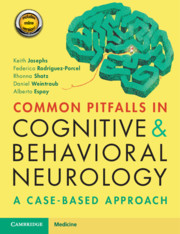Book contents
- Common Pitfalls in Cognitive and Behavioral Neurology
- Common Pitfalls in Cognitive and Behavioral Neurology
- Copyright page
- Dedication
- Contents
- Diseases Discussed in the Book
- Preface
- Acknowledgements
- Abbreviations
- Part 1 Missing the Diagnosis Altogether
- Part 2 Misidentifying the Impaired Cognitive Domain
- Part 3 Missing Important Clues in the History
- Part 4 Failure of Pattern Recognition
- Part 5 Difficult-to-Characterize Cognitive/Behavioral Disorders
- Part 6 Clinical Findings That Are Subtle
- Part 7 Misinterpreting Test Results
- Case 31 Does a Positive Amyloid Scan Always Mean Alzheimer Disease?
- Case 32 Herpes Encephalitis Recurrence?
- Case 33 Refractory “VGKC Encephalopathy”
- Case 34 sCJD with Negative 14–3–3?
- Case 35 You Have Been Diagnosed with Alzheimer Disease; Is That It?
- Part 8 Attributing Findings to a Known or Suspected Disorder
- Part 9 Missing Radiographic Clues
- Part 10 Management Misadventures
- Index
- Plate Section (PDF Only)
- References
Case 34 - sCJD with Negative 14–3–3?
from Part 7 - Misinterpreting Test Results
Published online by Cambridge University Press: 03 November 2020
- Common Pitfalls in Cognitive and Behavioral Neurology
- Common Pitfalls in Cognitive and Behavioral Neurology
- Copyright page
- Dedication
- Contents
- Diseases Discussed in the Book
- Preface
- Acknowledgements
- Abbreviations
- Part 1 Missing the Diagnosis Altogether
- Part 2 Misidentifying the Impaired Cognitive Domain
- Part 3 Missing Important Clues in the History
- Part 4 Failure of Pattern Recognition
- Part 5 Difficult-to-Characterize Cognitive/Behavioral Disorders
- Part 6 Clinical Findings That Are Subtle
- Part 7 Misinterpreting Test Results
- Case 31 Does a Positive Amyloid Scan Always Mean Alzheimer Disease?
- Case 32 Herpes Encephalitis Recurrence?
- Case 33 Refractory “VGKC Encephalopathy”
- Case 34 sCJD with Negative 14–3–3?
- Case 35 You Have Been Diagnosed with Alzheimer Disease; Is That It?
- Part 8 Attributing Findings to a Known or Suspected Disorder
- Part 9 Missing Radiographic Clues
- Part 10 Management Misadventures
- Index
- Plate Section (PDF Only)
- References
Summary
This 79-year-old left-handed woman presented after six months of progressive cognitive and behavioral changes. She rapidly became forgetful and easily confused, irritable, and had delusional thinking of people trying to harm her emerging over two weeks. Within three months, her language declined to the point where she couldn’t follow commands or produce intelligible or coherent speech. Her balance and walking declined, rendering her wheelchair bound. Her prior medication regimen consisted of amlodipine and atorvastatin, with no changes in recent years.
- Type
- Chapter
- Information
- Common Pitfalls in Cognitive and Behavioral NeurologyA Case-Based Approach, pp. 107 - 109Publisher: Cambridge University PressPrint publication year: 2020



